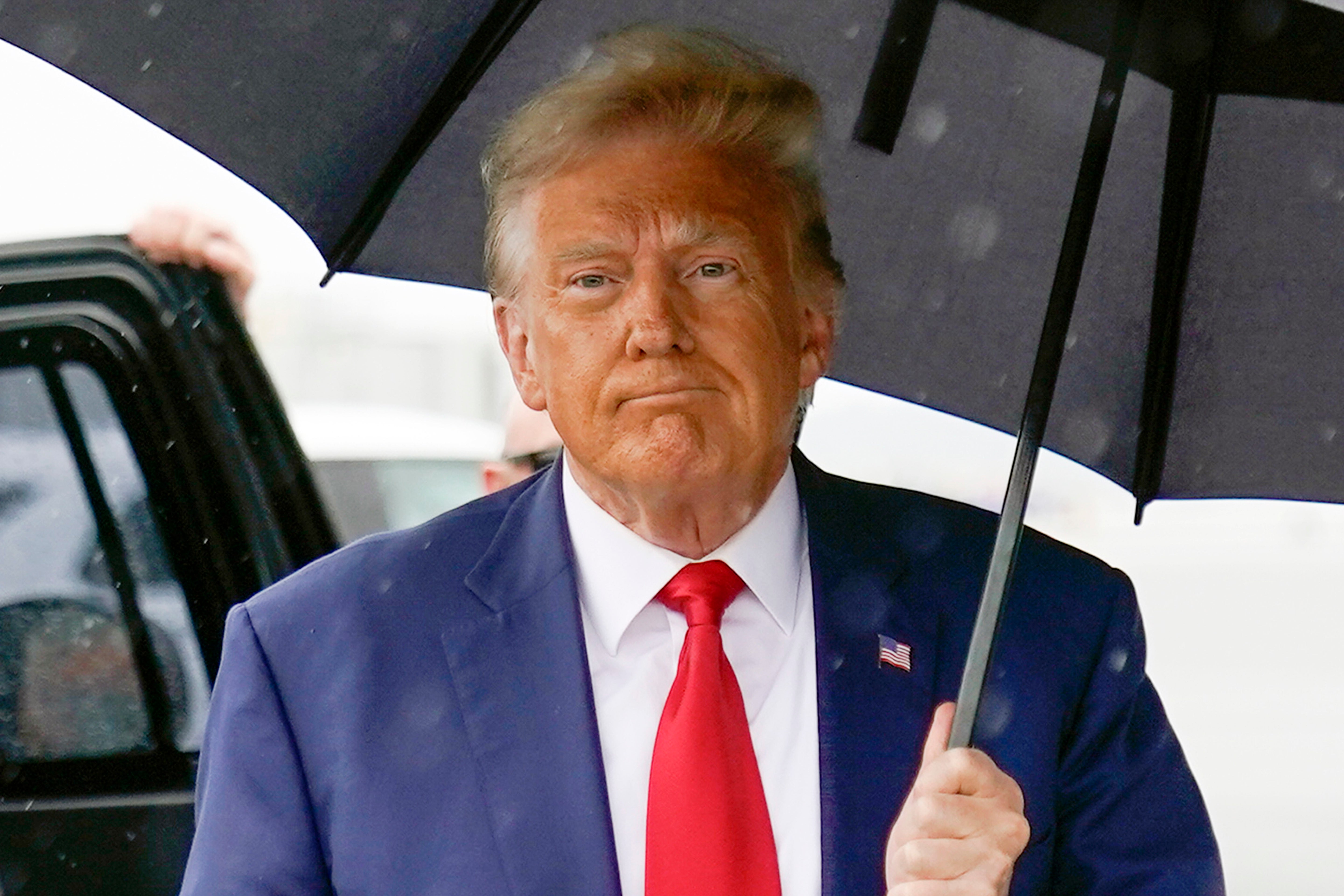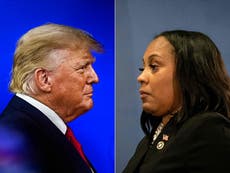Trump, Giuliani, Meadows - this indictment is the biggest yet. And the most serious
The indictment doesn’t shy away from naming names


Your support helps us to tell the story
From reproductive rights to climate change to Big Tech, The Independent is on the ground when the story is developing. Whether it's investigating the financials of Elon Musk's pro-Trump PAC or producing our latest documentary, 'The A Word', which shines a light on the American women fighting for reproductive rights, we know how important it is to parse out the facts from the messaging.
At such a critical moment in US history, we need reporters on the ground. Your donation allows us to keep sending journalists to speak to both sides of the story.
The Independent is trusted by Americans across the entire political spectrum. And unlike many other quality news outlets, we choose not to lock Americans out of our reporting and analysis with paywalls. We believe quality journalism should be available to everyone, paid for by those who can afford it.
Your support makes all the difference.Donald Trump and 18-codefendants have been indicted under a law that is engineered to prosecute the mob. Fulton County District Attorney Fani Willis has assembled the most comprehensive and wide-ranging indictment of the Trump accountability era, depicting Trump and his allies’ attempt to overturn the 2020 election as a “criminal enterprise.”
The 41-count grand jury indictment claims Trump and his co-defendants “unlawfully conspired and endeavored to conduct and participate in criminal enterprise in Fulton County, Georgia, and elsewhere.” It doesn’t shy away from naming names. The first page lists all 19 co-defendants and the adjacent 41 counts they’re accused of. Donald Trump is accused of 13 of the 41 counts, and his co-defendants include his former Chief of Staff, his former lawyers, a former DOJ official, a Georgia state GOP chair, fake electors, and county election officials.
The 19 defendants are Donald Trump, Rudy Giuliani, John Eastman, Mark Meadows, Kenneth Chesebro, Jeffrey Clark, Jenna Ellis, Ray Smith III, Robert Cheeley, Michael A Roman, David Shafer, Shawn Still, Stephen Lee, Harrison Floyd, Trevian Kutti, Sidney Powell, Cathleen Latham, Scott Hall, and Misty Hampton. The charges are serious and include racketeering, conspiracy to commit election fraud, false statements and writings, impersonating a public officer, forgery, criminal attempt to influence witnesses, computer theft, computer trespass, computer invasion of privacy, conspiracy to defraud the state, acts involving theft, and perjury.
The indictment outlines a sprawling criminal conspiracy built on the foundation of Georgia’s RICO (Racketeer Influenced and Corrupt Organizations) law. This law gives DA Willis the tools to piece together a “pattern of racketeering activity” encompassing multiple defendants who conspired to commit crimes as part of a broader, collaborative goal. And a pattern of organized criminal activity is exactly what is outlined in this indictment. Donald Trump and his allies were held accountable for just about every alleged criminal act we saw outlined in the January 6 hearings and more acts we didn’t know about until this week.
The indictment is structured around the 41 counts, with the bulk of the indictment detailing count 1: Violations of Georgia’s RICO Act. This section presents a robust timeline outlining the conduct of Trump and his co-conspirators, breaking down the methods and acts of the alleged “criminal enterprise.” The timeline spans conduct from October 2020 all the way to September 2022 and includes conduct that took place nationwide in furtherance of the conspiracy, including in Michigan, Arizona, and Pennsylvania. All 19 of the co-defendants are accused of this count and the conduct outlined within the count.
The indictment details the fake elector plot that included false statements, the creation of fake documents, and the solicitation of state legislatures to certify fake Trump electors instead of legitimate Biden electors. Trump’s phone call to Secretary of State Brad Raffensperger and other attempts to pressure state officials to overturn the election results is presented in this indictment as well. We all heard Trump’s “perfect call,” but seeing it laid out in the framework of “false statement” and “solicitation of violation of oath by a public officer” charges really puts the call into proper perspective.
The pressure campaign targeting former Vice President Mike Pence and Trump’s pressure on the DOJ is explicitly cited as well, including his infamous quote: “Just say that the election was corrupt, and leave the rest to me and the Republican congressmen.” The harassment and intimidation of election worker Ruby Freeman are also included in this indictment. The conduct outlined in Freeman’s riveting testimony during the January 6 hearings felt criminal, and now it’s being prosecuted as such.
One of the most stunning allegations in this indictment is the alleged conspiracy to breach voting machines. In their desperate attempt to prove their false voter fraud claims, Trump allies allegedly conspired to breach Coffee County voting machines and “stole data, including ballot images, voting equipment software, and personal voter information.” This was allegedly disseminated to other members of the enterprise and elsewhere. The co-defendants involved are allegedly former Trump lawyer Sidney Powell, former Coffee County election supervisor Misty Hampton, former Coffee County GOP official Cathy Latham, and pro-Trump poll watcher Scott Hall.
All of that conduct was listed in the RICO count in 161 separate acts, most of which are punctuated with the simple sentence: “This was an overt act in furtherance of the conspiracy.”
The RICO structure of this indictment is brilliant. By presenting each crime as part of an interconnected set of acts in furtherance of the broader conspiracy executed by the “criminal enterprise,” DA Willis can charge the enterprise as a whole with the conduct rather than proving everyone committed every single crime individually. This allows DA Willis to apply more pressure on the defendants and perhaps get some to cooperate with prosecutors. Another benefit of Georgia’s RICO law is that the charges would carry a mandatory minimum of 5-20 years in prison. Rudy Giuliani, who once used the federal RICO Act to take on the mob, has just been indicted himself under the same framework.
In a 1989 Supreme Court ruling on the federal RICO law, the high court ruled that RICO was created “broadly enough to encompass a wide range of criminal activity, taking many different forms and likely to attract a broad array of perpetrators.” Georgia is among the states who implemented their own RICO laws that are protected under this precedent. Given this context, legal experts have said that RICO could appropriately apply to Trump’s alleged criminal enterprise.
The seriousness of these charges and the threat they pose to Trumpworld are the key takeaways here, but the hypocrisy and irony of these charges are also notable. Donald Trump and his alleged “criminal enterprise” were indicted with charges that they falsely accused others of committing in the 2020 election. It’s Donald Trump and his team who are being indicted for a conspiracy to commit voter fraud, not Democrats. It’s Donald Trump and his team who are being indicted for allegedly breaching voting machines, not Democrats. It’s Donald Trump and his team who were trying to steal the 2020 election, not Democrats.
Georgia’s case brings Donald Trump his fourth criminal indictment, or fifth if you count the classified document case’s superseding indictment. It’s his second indictment in relation to his un-American effort to overturn the 2020 election. While Trump has been trying to make indictments part of his 2024 campaign for President, recently begging for another one, I highly doubt that he is happy with this one. This case complicates Trump’s plan to win the presidency to protect himself from criminal liability.
If Trump were convicted in this Georgia case, not only would he not have the power to pardon himself of the state charges, the Georgia governor doesn’t have that power either. That power resides with the Board of Pardons and Paroles. As Trump’s indictments mount, the odds that Trump might not escape accountability are increasing.
If convicted and facing a mandatory minimum of five years, it would be impossible to run the country from a jail cell. Georgia poses the greatest threat to Trump’s 2024 plans to save himself.




Join our commenting forum
Join thought-provoking conversations, follow other Independent readers and see their replies
Comments